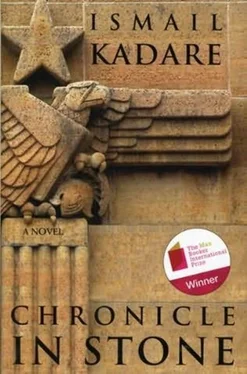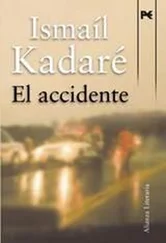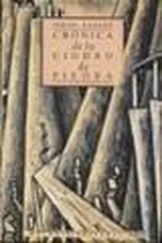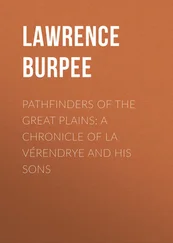Ismaíl Kadaré - Chronicle in Stone
Здесь есть возможность читать онлайн «Ismaíl Kadaré - Chronicle in Stone» весь текст электронной книги совершенно бесплатно (целиком полную версию без сокращений). В некоторых случаях можно слушать аудио, скачать через торрент в формате fb2 и присутствует краткое содержание. Жанр: Современная проза, на английском языке. Описание произведения, (предисловие) а так же отзывы посетителей доступны на портале библиотеки ЛибКат.
- Название:Chronicle in Stone
- Автор:
- Жанр:
- Год:неизвестен
- ISBN:нет данных
- Рейтинг книги:4 / 5. Голосов: 1
-
Избранное:Добавить в избранное
- Отзывы:
-
Ваша оценка:
- 80
- 1
- 2
- 3
- 4
- 5
Chronicle in Stone: краткое содержание, описание и аннотация
Предлагаем к чтению аннотацию, описание, краткое содержание или предисловие (зависит от того, что написал сам автор книги «Chronicle in Stone»). Если вы не нашли необходимую информацию о книге — напишите в комментариях, мы постараемся отыскать её.
Chronicle in Stone — читать онлайн бесплатно полную книгу (весь текст) целиком
Ниже представлен текст книги, разбитый по страницам. Система сохранения места последней прочитанной страницы, позволяет с удобством читать онлайн бесплатно книгу «Chronicle in Stone», без необходимости каждый раз заново искать на чём Вы остановились. Поставьте закладку, и сможете в любой момент перейти на страницу, на которой закончили чтение.
Интервал:
Закладка:
“Don’t worry,” her husband said.
One of the carabinieri took him by the elbow and the little group moved off.
“Dirty fascists,” someone muttered.
The people who had gathered to watch now dispersed in silence. At noon there was more heavy bombing.
The next day I saw a face I thought I recognised among the people filing past endlessly. He was staring at me. I had seen that fair hair and those troubled eyes somewhere before. At last it came to me. This was the boy who had kissed Aqif Kashahu’s daughter in our cellar during the bombing.
After hanging around us for a while, he motioned to me. I shrugged. He gestured for me to follow him. He seemed not to want to come over. I got up and followed him. We went out onto the wide esplanade. It was chilly.
“What’s your name?” the boy asked me.
I told him. We had stopped near a battlement and the icy wind cut your face like a knife. The city lay in the chasm below.
“Do you recognise me?” he asked.
“Yes,” I said.
“OK then. It was right in your cellar. Do you know what happened?” He grabbed me sharply by the shoulders. “Yes or no, say something! Do you know or not?”
“I know,” I told him.
The boy who had kissed Aqif Kashahu’s daughter took a deep breath.
“All right, have you seen her since…?”
“No.”
He clamped his jaw tight.
“In this city love is forbidden,” he said in a lower voice. “You’ll find out some day, when you grow up.”
(… garita!)
He kept kicking the rampart with the tip of his shoe.
“Listen,” he said. “I’m afraid they may have killed her. What do you think?”
I shrugged.
“In this city there are two ways to get rid of pregnant girls: suffocate them in a juk or drown them in a well. What do you think?”
I shrugged again. It was getting even colder.
“So you haven’t seen her anywhere in the neighbourhood?”
“Nowhere.”
“No one has seen her?”
“No one.”
“Are there many wells in your neighbourhood?”
“A few.”
He started biting his nails.
“If only I could find her body,” he said dully.
The wind was blowing. I was freezing.
“I’ll look for her everywhere,” he added.
He had unusually long fingers. He looked out at the grey cliffs. The city’s numberless roofs were barely visible in the fog.
“If I can’t find her, I’ll go to hell to look for her.”
I wanted to ask him what he meant by that, but I was afraid.
Without another word he walked off quickly across the esplanade.
They were flying slowly, their wings outspread, and for a moment I thought they were going to land on the abandoned airfield, but they turned abruptly and headed for the city. Their wings flashed in the sun with menace. Now they were almost overhead, just at the altitude from which they usually started their dive-bombing. One last manoeuvre and they swooped down on the city one after another, almost vertically.
It was spring now. From the window two flights up I was watching the storks fly back. Circling the tops of minarets and the tall chimneys, they looked for their old nests, and the ellipses they traced in the sky clearly showed just how sad and dismayed they were to find their nests damaged or destroyed by the impact of the bombs and by the wind and rain of the past winter. As I watched them, I was thinking that storks could never imagine what could happen to a city in the winter, while they were away.
TWELVE
It was Sunday. From below came the noise of the pick swung by a neighbour who had been working for two weeks on a modern air-raid shelter like the one Lady Majnur had just had built. The bombing had stopped when spring began. We had been back in our homes for some time. The Karllashis and Angonis were the first to build modern shelters and leave the citadel. Next to leave were the nuns and prostitutes, whose shelters had been taken care of by the army. Then the people who had the money to build their own modern shelters went home. But most of us left the citadel only after the English bombing had eased. The first thing that struck me when we went home was that the tin sign saying “shelter for 90 persons” was gone. Someone must have taken it down while we were away, and the wall now had a light rectangular mark that gave me an empty feeling in my heart every time I looked at it.
Our neighbour’s pickaxe continued its regular thud. Sunday had spread out all over the city. It looked as if the sun had smacked into the earth and broken into pieces, and chunks of wet light were scattered everywhere – in the streets, on the windowpanes, on puddles and roofs. I remembered a day long ago when Grandmother had scaled a big fish. Her forearms were splattered with shiny scales. It was as if she was a Sunday all over. When my father got angry, he was a Tuesday.
I could hear the voices of Grandmother and Aunt Xhemo coming from the other room. They were still talking about the same thing. The neighbourhood women who had been coming by all morning, retailing ever more astounding pieces of news, had gone home to prepare lunch, but Grandmother and Aunt Xhemo went back to the conversation they had been having the previous Sunday. It seemed to me that all their chatting derived from prior conversations which were themselves the sequels of even older discussions going back to ancient times. I had also noticed that some topics of current interest were never broached directly. They would circle round the old ladies like buzzing flies, but could not cross the barrier of their indifference. At best a topic of that kind would take two or three weeks to gain admittance to the conversation, but most never achieved such a privilege.
All morning, the local women had made a whole series of guesses about a very recent event. My mother, as she brought Grandma and Aunt Xhemo their coffee, had asked them two or three times: “Have you heard the latest?” Obstinate as they were, they pretended not to hear, and they carried on elaborating a conversation that had been begun long ago, in the first year of the monarchy, or perhaps even further back, in the year 1901. Sitting beside them, I waited in vain for the expression of some opinion on the latest news. It was one of the few occasions when I felt angry with the old ladies. Stubborn as mules! I muttered to myself. Did they not grasp that the issue ought to make them prick up their ears, or were they dragging things out just to heighten the expectation that they would have something to say?
What had happened was deeply disturbing to me. Someone had gone into our cistern the night before. Fresh footprints were everywhere. Whoever it was had not even replaced the cover, and ashes had been found in a bucket that still smelled of kerosene. Apparently the intruder had used it as a torch to light the inside of the cistern.
For some time now there had been rumours that someone, or rather, some ghost, had been going down into the neighbourhood wells at night. Are there many wells in your neighbourhood…? At first the old ladies thought it was the ghost of someone called Xuano, who had been murdered in a dispute over property and was now seeking the gold he had hidden. But Aqif Kashahu’s deaf mother, who never slept at night, swore that with her own eyes she had seen the man coming out of their well at daybreak. If I can’t find her, I’ll go to hell to look for her … She had even spoken to him and, strangest of all, by her own account, she had seen his lips move in reply, but as she was deaf she hadn’t understood any of what was said.
Was it really him?
The roofs seemed dazed by the light. I walked over to the pile of bedding. The mattresses, blankets, pillows and lace-edged sheets – that whole soft white heap that was called juk - lay silent as a snare. In this city there are two ways to get rid of pregnant girls: suffocate them in a juk or drown them in a well .
Читать дальшеИнтервал:
Закладка:
Похожие книги на «Chronicle in Stone»
Представляем Вашему вниманию похожие книги на «Chronicle in Stone» списком для выбора. Мы отобрали схожую по названию и смыслу литературу в надежде предоставить читателям больше вариантов отыскать новые, интересные, ещё непрочитанные произведения.
Обсуждение, отзывы о книге «Chronicle in Stone» и просто собственные мнения читателей. Оставьте ваши комментарии, напишите, что Вы думаете о произведении, его смысле или главных героях. Укажите что конкретно понравилось, а что нет, и почему Вы так считаете.












